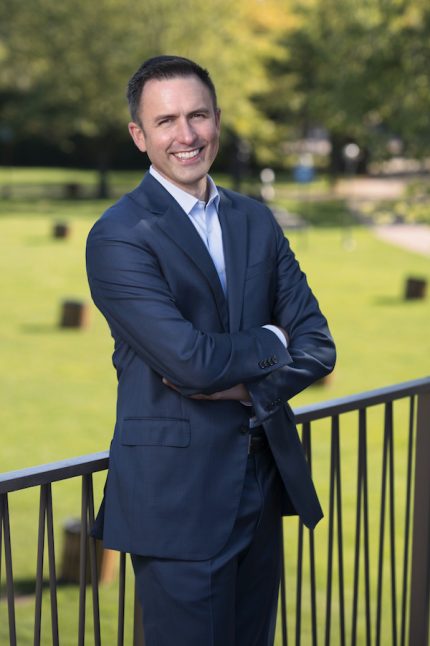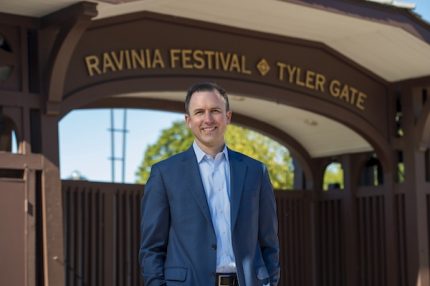Ravinia’s new low-key chief brings people skills, flexibility to challenging times

Jeffrey P. Haydon, the Ravinia Festival’s new president and CEO, has found a perfect way to describe the job of planning a major international music festival during a pandemic.
“It’s been an extremely iterative process,” he declared solemnly. Then he laughed. “This is the first time I’ve actually come up with that answer to that question. I think I like it the best.”
“Iterative process” is a popular buzzword these days, a reassuringly measured, faintly academic term for reworking a project when carefully crafted Plans A, B, C and beyond fall apart as reality shifts. Iterative certainly sounds better than “bonkers” or “crazy” to describe how the unpredictable Covid-19 pandemic has required Ravinia to cancel its entire 2020 season and repeatedly redesign its plans for 2021.
But the final redesign is in place. Ravinia opens its 2021 festival on July 1. Continuing through September 26, the festival’s 85th season offers fewer concerts than recent years, approximately 80 instead of 110 or so. Performances will be shorter with no intermissions, and all concerts will be outside, either in the Pavilion or the open-air Carousel. Several chamber performances in Bennett Gordon Hall will be broadcast to lawn-only audiences. Attendance at first will be limited to 60 percent of capacity in the 3,350-seat Pavilion and socially distanced pods on the lawns. If the pandemic continues to recede locally, Haydon thinks Ravinia could be operating near full capacity toward the end of the season.
But otherwise, the 2021 season is familiar, offering Ravinia’s typically eclectic mix of classical and non-classical music.
The Chicago Symphony Orchestra will be on hand for six weeks, July 9-August 15, with Marin Alsop, the festival’s new chief conductor and curator, leading seven of the 15 programs. There will be familiar names—former Ravinia music director James Conlon, violinists Joshua Bell and Pinchas Zukerman, pianists Garrick Ohlsson and Misha and Cipa Dichter. And exciting newcomers—soprano Julia Bullock, bass-baritone Davóne Tines, Jessie Montgomery, the CSO’s newest composer-in-residence; and composer Tyshawn Sorey.
Even without a pandemic, Haydon, tall, with a relaxed, friendly manner and a ready smile, faced a challenge when he arrived last September. Welz Kauffman, his predecessor, retired in late August after 20 years. He left Ravinia in relatively good financial shape, though canceling the entire 2020 season required a $6 million draw from its reserves, $2.5 million more than budgeted. He had overseen some major capital improvements, and overall attendance was strong.
The CSO’s Ravinia programming become lackluster after Conlon left in 2015. But last February Kauffman signed Alsop, a respected conductor and highly creative programmer. Prospects for stimulating, thought-provoking CSO residencies suddenly seemed a bit brighter.
It’s never easy being the new guy on the block, perhaps arriving with new ideas and approaches, some more welcome than others.
But in a perverse way, the Covid-19 pandemic has helped ease the transition. For Ravinia, along with just about every other arts organization on the planet, business as usual simply wasn’t an option.
“I’ve known Welz for probably 25 years,” said Haydon. “He was one of the first people I met in the industry back when he was at the New York Philharmonic. I’ve appreciated the times when he reached out and gave me support and encouragement. I’ve watched him from close and afar. It’s very humbling and exciting to jump into his big shoes here.
“Any time you have a big leadership change, it’s a big moment for the organization. I felt in many ways the pandemic helped with that change. It wasn’t just a leader that was changing; it was a whole world that was changing. That clarified for all of us immediately, how do we find our north star and get there together?”

Haydon brings impressive credentials to his new job. He joins Ravinia from the Caramoor Center for Music and the Arts, a high-profile summer festival in Katonah, New York. Like Ravinia, it mixes classical concerts with other genres. During Haydon’s nine years as CEO, he oversaw a major renovation of festival buildings and expanded both Caramoor’s audience and its endowment. From 2003 to 2012 he was executive director of the Ojai Festival, a prestigious four-day contemporary music festival held each summer in a bucolic town northwest of Los Angeles. Early in his career he spent three years with the Chicago Symphony’s development department. Haydon’s wife, Kathryn, is a fourth-generation Chicagoan, and they have settled with their teen-aged son in Lake Bluff.
Growing up in the San Francisco Bay area, Haydon played trumpet and tuba in his elementary and high school bands, and he also sang. But the arts management bug bit early. His parents, who played instruments, were also entrepreneurs, “everything from little mom-and-pop retail,” said Haydon, “to a medium-sized company.” He was fascinated by the process of running a business. As a student at the University of Puget Sound in Tacoma, Wash., Haydon helped run the university’s busy student performing arts series.
“I was never interested in a performing career, though music was something that inspired me,” he said. “I had a lot of different interests. I liked business and was always interested in how things worked. And I realized in college that not a lot of people understood both the business side and the artistic side. It was like speaking two languages. And I thought, if there aren’t that many people out there, this is something I could be helpful with.”
His academic credits include the Stanford Business School’s Executive Non-Profit Leaders in the Arts program. Advice on navigating a global pandemic was not on the syllabus.
“We’re all still looking for that chapter in our book,” he said with a hearty laugh, ‘How to Run an Organization in a Pandemic.’ So often in these kinds of situations, we’re charting new territory. But in really good teaching, you don’t teach about what to do. You teach about how to do things and why you do things. And that’s resilience.
“Even with the pandemic or a great recession or political unrest, those principles still hold. That’s the key in all of this—not to get caught up in the uniqueness or the intensity of the moment. But to keep going back to core principles—knowing what the core principles are for your organization. Because that’s where your values are tested. It’s not in the good times; it’s in the bad times.”
Since arriving at Ravinia, Haydon has been immersed in organizing a 2021 season that would actually be doable. At first, a solution seemed simple: about 60 percent of Ravinia’s canceled 2020 programs could be rescheduled for 2021. But the continuing pandemic and performance limitations trashed that optimistic plan.
“By December, we began to realize that 2021 wasn’t going to be entirely free of restriction,” he said. “We quickly realized we probably shouldn’t present choruses; we shouldn’t expect large orchestras, or artists on big road tours. We started talking to everybody about modifying the programs that were already set. Everybody was fine with that.”
But as global travel continued to stall, all of Ravinia’s international artists canceled, once again upending the festival calendar. Then in March, with the U.S. pandemic numbers starting to recede, the situation shifted again.
“It’s amazing,” Haydon said. “When California said it was going to open up, the phone started ringing from agents. Then road tours started thinking about coming.”
Despite the daunting, ever-shifting logistics, Ravinia’s 2021 season is more than a cobbled-together hodgepodge. Several programs reflect the festival’s commitment to broadening its classical music focus. Works by female composers from Amy Beach and Florence Price to contemporary composers Stacy Garrop, Jessie Montgomery and Augusta Read Thomas are on the roster. Notable artists of color will perform, among them clarinetist Anthony McGill and singers Julia Bullock and Davóne Tines, all making their Ravinia debuts.
Haydon and Alsop haven’t had time to luxuriate in extensive brainstorming about Ravinia’s orchestral future, but they agree on some basic ideas.
“We both have a strong commitment to moving the orchestral experience forward into the 21st century,” he said, “looking at diversity of artists, composers and repertoire. There’s a lot of great contemporary music and a lot of great classical music. We can help boost some really important careers. This can be innovative. This can be interesting. This can be fun.”
The Ravinia Festival opens to the public in July with Garrick Ohlsson performing music of Brahms, a four-part series devoted to the composer’s piano music. ravinia.org
Posted in Uncategorized


